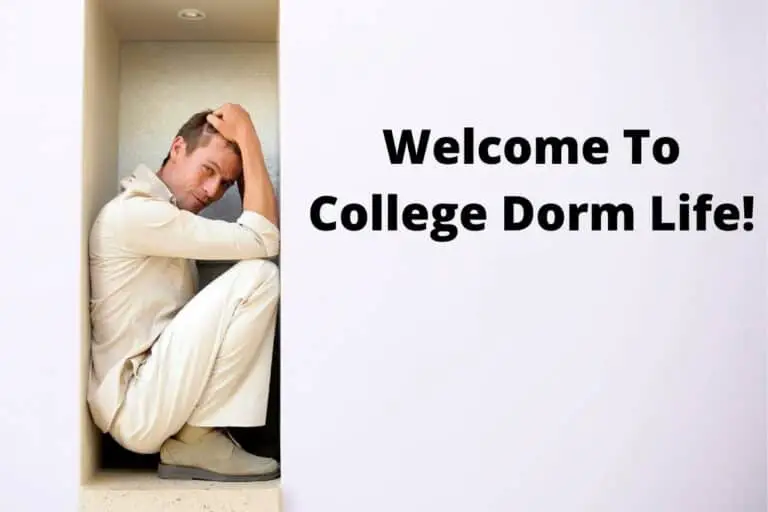Why Are College Campuses So Big? 10 Reasons
It’s not unusual for some colleges to have a student body population equivalent to that of a small city or a large town. These colleges also have sprawling campuses, so large that you can get all your daily steps in just by walking to and from class!
College campuses are so big because of the large population of students from different levels of education who need accommodation and places for academic and extracurricular activities. Plus, there’s a wide range of research programs that need a dedicated space.
In this article, I’ll be breaking down each of these reasons in greater detail so that you can understand why these campuses are so large. Whether you’re just curious or are trying to find out if a large college is right for you, the forthcoming discussion has the answers you seek!

10 Reasons Why College Campuses Are So Big
There are a lot of nuances that go into the working mechanisms of a college campus. Ask any professor or teaching staff; the levels of administration needed for every little aspect of college life are indeed something to behold.
The size of a college campus almost always boils down to student body population and incoming money, but it would be reductive only to list these as the reasons for the campus’ size.
These ten reasons for big college campuses capture why size really does matter for all of the inner workings of a functioning college experience:
1. Large Colleges Are Research Hubs
When you think of large campuses, the colleges that come to mind do more than just teach undergraduates. The professors are often also responsible for publishing original work, graduate-level advisement, intradepartmental affairs, as well as their teaching load for undergraduate classes per semester.
To be granted tenure, which is what every professor is aiming for, you must have some set amount of publications accepted every academic year. Each college sets its standards for tenure, and the professors conduct research to meet those standards.
Research usually requires more than just pen and paper. Research-heavy schools will have to provide the facilities for the research, such as labs for each of the sciences. It’d be a lot harder to conduct medical research at a college that has no labs with medical equipment!
In addition to the facilities, the professors also need assistance with their research. This is why research-heavy schools are also where graduate programs are located. Graduate students have their education furthered with the funding they receive by assisting the professors with teaching, research, or other projects.
Once the graduate students receive their degree, they then can go on to become professors with their own graduate students as assistants (source).
2. Different Levels of Education
Researching professors usually bring graduate programs along with them. To become an expert in a field, you need to complete more than a bachelor’s degree; you need a Master’s or Doctorate.
As discussed briefly above, the tenured professors will be experts in their field and so be advisors and teachers for graduate-level students, in addition to undergraduates. Having an entire second and even third level of a college education requires more space.
This is why you often see smaller liberal arts colleges without graduate programs. The main focus is teaching at the undergraduate level, resulting in the ability to keep the campus much smaller than research schools with graduate programs.
Graduate students are also often teaching assistants or even teaching their own undergraduate classes, so they need their own offices to aid students and plan their sessions.
The college will also need to provide housing for graduate students, especially those who are traveling far from home. It increases campus size substantially since the college usually tries to provide housing that’s entirely separate from undergraduate housing.
3. Many Students Are From Out-of-State
Speaking of student housing, out-of-state students are often the primary ones in need. Not only are they moving to go to college, but they’re also less likely to know anyone in order to coordinate a roommate setup. These days, some of the largest colleges have more than half of their students joining them from other states.

Of course, there are plenty of in-state students that end up living in the campus dorms, but the necessity mostly comes from those moving from elsewhere. Housing takes up a lot of space, and as student body populations rise, the need for more housing space is also increased. Most of the time, that growth results in the expansion of the campus.
It’s easy to see why this would be such a large factor. Most students are coming to college after living with their parents for their entire lives. It deters a lot of potentially dangerous situations if you provide students with a safe place to live on campus, at least until they’re more settled in after a semester or two (source).
4. College Athletes Need Room To Run
It wouldn’t be a complete conversation about college without mentioning college sports! Whether your college is big into the sport of football, basketball, or curling, these sports need arenas — and arenas are quite large!
In addition to arenas for college games, it’s common for colleges to have separate fields for team practice and regulation games in sports like football. Now instead of one, you need at least two football fields! Those yards may look pretty small on your television, but they add a lot of size to a college campus.
5. More Money, More Majors
Typically, large schools will have more money than small ones from tuition and state funding. When colleges have more money, they can usually house more types of education for students to major in.
For example, the small liberal arts college where I completed my undergraduate degree had a pretty typical spread of majors — subjects like Humanities, Business, English, Psychology, etc. However, the college that I completed my MA with had things like Film Set Design and Zoology for Vets. These programs are going to require some special space accommodations.
Suddenly, you not only need space for the classic majors, but now you need film sets and places to house your elephants. In the case of medicine programs, you might need an entire morgue for cadavers or body parts.
The higher number of majors a college offers, the more space that’s needed to deliver that education. As education gets more and more specialized, that’s going to come with needs that push the boundaries of campus out even farther!
6. The Libraries Need To Be Extensive
College libraries are either ornate and beautiful or cold and suffocating, in my own humble experience. My colleges were all concrete and dried gum, but others have worn in leather seats with crown molding. In either case, they’re filled with books for every topic under the sun for their students and faculty.
However, once a college starts leaning more into their research and starts offering more majors, that means the library also needs to expand to meet the needs of both. There’s often a problem with finding more room for books, so this often means a new library building entirely.
At UW-Madison, for instance, there are several libraries for various schools within the institution. Depending on your major or area being researched, the book you need might be in one or all of the libraries.
As has been said with other expansions that colleges go through, buildings take up space, and so this is one reason that college campuses can get so large. If you have a student body and faculty set that requires eight separate library buildings, things can get pretty big (source).
7. More Money, More Problems
Having a lot of money comes with a long, long list of questions. Colleges with large campuses have a lot more money since it’s a reflection of their student body population, tuition profits, and state funding.
With all of that cash flow, the entire administration system and offices need to also exist to make sure the money is collected and spent in the appropriate ways. When you have the student body population at the same number as some small cities, the need for advertisement, financial aid, enrollment, bursar, etc., will be much more extensive than in a smaller liberal arts campus.
My undergraduate school was very small, and the student advising office was one smallish room, with cubicles and about five employees. However, it was an entire three-story wing with hundreds of people employed at my graduate institution.
That’s true for all of the different offices needed in a large college. Instead of a small room, there are entire buildings dedicated to collecting your money, spending that money on various things, and administering each aspect of your college experience.
Once the student body population is in the tens of thousands, the large amount of administration is just a necessary response. It already takes hours to get through the financial aid office. Can you imagine if there were only five financial advisors?
8. Aiming for an Aesthetic
College campuses are often very beautiful. One large campus I recently visited for a conference was especially so, with restored brick buildings surrounded with lush greenery, water fountains, and stone pathways winding throughout. Sometimes colleges will even pay to bring in animals to complete the look!
This aesthetic isn’t a fluke. The colleges work very hard to create the environment they have. Schools will have landscapers, painters, and other folks on staff to maintain their campuses.
In other words, having more money means that the college will have more resources to spread out and make their campus’ environment more beautiful. Whether or not you think this is money well spent, it’s very common for colleges of all sizes.
9. Greek Life Needs a Home
There was an entire 2.5 mile (4.02 km) stretch of just Greek life housing at the college I received my MA at. This is in addition to the regular student housing!
Larger schools often have a larger number of students belonging to a sorority or fraternity. In Greek life, each group (House? Club?) often has its own residence where members live with each other. The college needs to be sure that there is enough housing to allow for the potential of lots of incoming students wanting to rush each semester.
Larger schools might not necessarily have the highest percentage of their entire student body join a fraternity or sorority, but 30% of a huge population is potentially going to require more beds than 70% of a very small one (source).
10. Extracurriculars Need Extra Space
I touched on this one slightly before, but it’s worth its own reason — space for all of the extracurriculars offered at college! Plenty will take place in empty classrooms, like the debate club and Dungeons and Dragons club I joined in college.
A large campus is going to contain a lot of buildings meant to make some of these activities possible. There are entire gyms on some college campuses dedicated to intramural football and tennis, in addition to the fields and courts for the official games!
Schools with animal husbandry or veterinary programs will also need to have specialty buildings for the extracurriculars involved, such as stables and barns for farm animals. The largest college where I am from has several acres dedicated to 4H animals.
Final Thoughts
A lot of these reasons can be traced to a few fundamental things — the variety of education available, money coming into the college, and types of research the college is most interested in contributing to. However, those things don’t capture the whole story of why college campuses can be so big!
Some of the reasons are about providing beauty and creating a carefully crafted experience for those enrolled. While it can be overwhelming and intimidating at first, these large college campuses can end up feeling like your own small world once you hit your stride!
Recommended Reading:


![Is Khan Academy a Scholarly Source? [Solved]](https://campusleaders.org/wp-content/uploads/2021/10/khan-academy-as-a-scholarly-resource-768x512.jpg)



